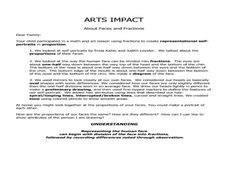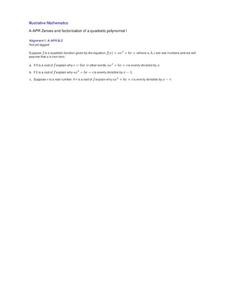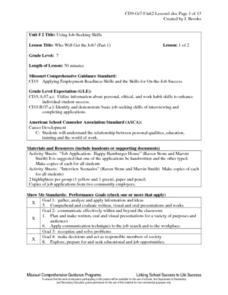Balanced Assessment
Survey Says
Examine statistical data that shows an overlap in responses. The data tallies over 100% and learners interpret this data characteristic. They then create a graph to represent the data.
Curated OER
Testing Foods
Students perform an experiment using brown paper bags to determine which foods have oil in them. This task assesses student's abilities to make simple observations and inferences from them.
Curated OER
Measurement: Length, volume, and temperature
Young scholars determine the temperature of the water in a cup, measure the length of a piece of cardboard, and measure out an appropriate volume of water. This task assesses student's abilities to perform measurement and reporting skills.
Curated OER
Pulse
Students determine a baseline pulse rate then chart the changes in rate with exercise. They describe the changes and develop a rationale for their observations. The task assesses students' abilities to make simple observations, determine...
Curated OER
Comprehension
Fifth graders take part in a panel discussion. In this character lesson students show their understanding of the connection between events in a story and the development of characters. Students provide evidence from the story to support...
Curated OER
Assessing Women's Past Through Art -- An Interpretation Activity
Pupils examine art from a certain period. They write a story recreating the life of a woman. They examine pictures and answer questions related to each one.
Curated OER
Tadpoles
Learners examine tadpoles at various stages of development. Questions in observation category assess students' ability to use a variety of senses to observe data in a certain way-scientific way.
Noyce Foundation
Truffles
Knowing how to scale a recipe is an important skill. Young mathematicians determine the amount of ingredients they need to make a certain number of truffles when given a recipe. They determine a relationship between ingredients given a...
Inside Mathematics
Winning Spinners
Winning a spin game is random chance, right? Pupils create a table to determine the sample space of spinning two spinners. Individuals determine the probability of winning a game and then modify the spinners to increase the probability...
Inside Mathematics
Squares and Circles
It's all about lines when going around. Pupils graph the relationship between the length of a side of a square and its perimeter. Class members explain the origin in context of the side length and perimeter. They compare the graph to the...
Noyce Foundation
Which is Bigger?
To take the longest path, go around—or was that go over? Class members measure scale drawings of a cylindrical vase to find the height and diameter. They calculate the actual height and circumference and determine which is larger.
Noyce Foundation
Baseball Players
Baseball is all about statistics. Pupils solve problems related to mean, median, and range. They calculate the total weight of players given the mean weight, calculate the mean weight of reserve players given the mean weight of the...
Noyce Foundation
Building Blocks
Building blocks have more uses than simply entertaining children. Young mathematicians calculate the volume of a given cube, and then calculate the volume and surface area of a prism formed from multiple cubes.
Sargent Art
Metal Embossing Weathervanes
Metal work has been used for hundreds of years. Ninth graders get a chance to experience the artistry of metal embossing in this highly structured lesson. Each step is accented with a helpful image and related instruction. The end...
Curated OER
About Faces and Fractions
Third graders review concepts of fractions, and one-half. They discuss self portraits and the relationships of eyes, nose and mouth to the whole face. Students create base-line self-portraits. On the second day, 3rd graders observe and...
Brigham Young University
Problems? Working it Out
Working in pairs, set designers take turns sharing their sketches, explaining how their renderings articulate their concept, and receiving feedback on concerns and questions.
Fluence Learning
Writing About Informational Text: Music and the Brain
Even if you've never picked up a musical instrument, chances are that music has directly impacted your mental and emotional development. Sixth graders engage in a reading activity in which they read two articles on the impact of music on...
New York City Department of Education
What Did I Do to Be so Black and Blue: How Did Jazz Influence Ralph Ellison's Invisible Man
How did jazz influence Ralph Ellison's Invisible Man? Class members read some of Ellison's non-fiction writings about blues and jazz, listen to records, watch videos, and engage in student-centered discussions. They then produce podcasts...
Curated OER
Sharing Gum
Young mathematicians solve arithmetic and simple algebraic equations using properties of real numbers, equality, and inequality. Justifying the procedures is their next task. They solve a problem involving linear inequality and justify...
Illustrative Mathematics
Zeroes and factorization of a quadratic polynomial I
This activity uses the division algorithm and the definition of a zero/root of a function to guide your class to see the relationship between zeros and factors of a general quadratic, which can later be generalized to the Remainder...
Curated OER
Physical Fitness: Lesson number 2
Young scholars are assessed on the amount of improvement they make over a period of 6 weeks. They keep track of their improvement on an Excel spreadsheet so they can also see their improvement. This lesson focuses on leg and arm strength.
Curated OER
Who Will Get The Job? (Part 1)
Seventh graders are asked a variety of questions and identify the skills as job-task or not. As a class, they discuss how they could lose a job before they start working and review how to sell their skills for the job posting. To end the...
Curated OER
100th Day of School
Young scholars participate in various motor skill activities while counting to 100. These activities are designed to go with the 100th day of school. They will complete various tasks such as jumping rope, tossing, running, and catching...
Illustrative Mathematics
Watch out for Parentheses
It is important for the algebra learner to understand the use of parentheses. Mathematicians of all levels can make errors with nested parentheses. This will give them some practice. It makes for a good class starter or quick assessment.

























